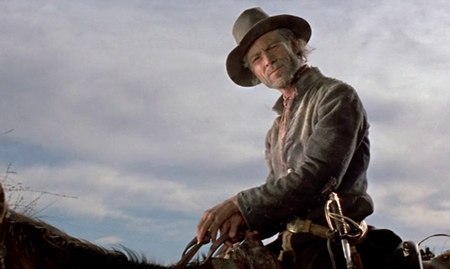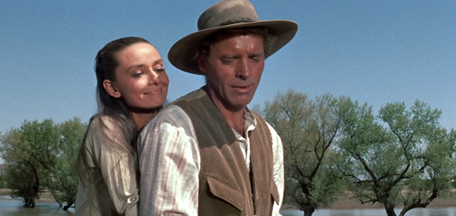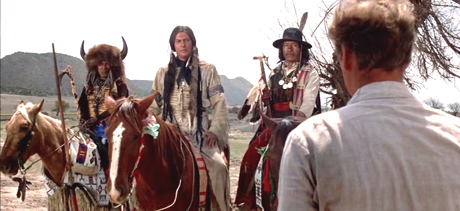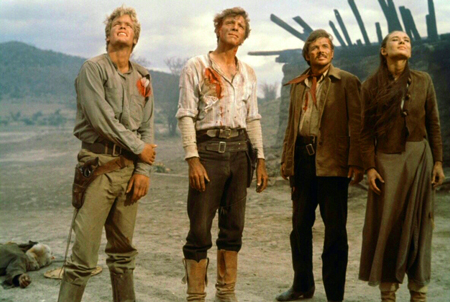Reviewed by Glenn Erickson
One of the better westerns of its day, The Unforgiven features top Hollywood talent in service of author Alan LeMay's complex reworking of his own The Searchers. The show is exciting, original and unusually frank about its subject matter. Only a too-conventional ending lets it down.
Ben Maddow's screenplay holds John Ford's masterpiece up to a more realistic mirror. The Zachary clan of West Texas is expecting good times ahead, with possible intermarriage between their family and their partners in cattle ranching, the Rawlins family. But trouble looms when Abe Kelsey (Joseph Wiseman) appears on his horse in a tattered Union uniform. The crazy old loner declares that the Zachary daughter Rachel (Audrey Hepburn) is a purebred Indian. Soon the neighbors fear another Indian war, when Kiowa brave Lost Bird (Carlos Rivas) tries to buy Rachel with horses. Mother Mattilda Zachary (Lillian Gish) swears that Rachel was a white foundling, pleas that do no good when young Charlie Rawlins (Albert Salmi) comes a-courtin' and is slain by the Indians. The Rawlins patriarch Zeb (Charles Bickford) wants Rachel 'examined' to see if she's Indian, The head of the Zachary clan Ben (Burt Lancaster) refuses, even when his brother Cash (Audie Murphy), an unrepentant racist, disowns his own adopted sister. Mattilda finally succumbs to pressure and reveals her secret ... but only as the Indians prepare to take Rachel by force.

The fascinating The Unforgiven gives a wholly believable account of white-Indian relationships on the frontier, which can be best summed up as blind racial hatred engendered by generations of violence and reprisals. It's especially interesting in its depiction of white culpability -- not as guilt per se, but as a consequence of racial denial. The stubborn Zachary matriarch causes families to crumble and neighbors to fall out. Wholesale killing is seen as inevitable, given the natural opposition between the alien cultures of the Native Americans and the Anglo settlers.
The movie closely follows the blueprint of The Searchers, replacing John Ford's poetic exaggerations with John Huston's own brand of naturalism and absurdity. Joseph Wiseman's Abe Kelsey arrives much like The Searchers Ethan Edwards, with a uniform and saber, but this time spouting mad Bible prose about a stolen Kiowa babe, now living as white. Like Ethan, he's a vagrant without a home, obsessed with memories of children killed by or lost to the Indians.
Ethan Edwards exhibits contradictory impulses, that The Unforgiven distributes among several characters. Kelsey is the wanderer. Ben and Cash Zachary are the brothers with conflicting ideas -- Ben loves Rachel but doesn't know it, and Cash would like to see her dead.
John Ford's film may be the classic and Huston's the wannabe, but John Huston's film has a better handle on its themes. Here the whites openly brag about the massacres of savage tribes. The past event that motivates the action is not an Indian crime but an act of needy love by Lillian Gish's Mattilda. Given a babe in arms immediately after losing her own, Mattilda resolved her racial conflict by simply deciding that her love would make it white. She still hates Indians more than ever.

The Unforgiven astutely equates self-righteousness with destructive racial hate. The God-fearing Rawlings turn into vengeful zealots when they lose a son. Cash Zachary lives and breathes his hatred so openly that living with his own sister becomes intolerable. Mattilda is so desperate to maintain her illusions that she murders a man whose only crime is to tell an unpopular truth. Even Ben can sense that Abe Kelsey's lies are too powerful to be all lies -- the first act of our heroes is to sneak out on a shameful murder hunt.
The Searchers paints its Texans in broad, often comic strokes. The characters here are the same archetypes as John Ford's in a more naturalistic context. The active elements are still Race, Sex and Violence. Burt Lancaster's hearty rancher Ben sublimates his love for his adopted sister Rachel, who obviously loves him as well. In The Searchers all that remains of Ethan's beloved Martha is his niece Debbie; Ethan's psychotic urge to kill Debbie is definitely sex related. Less perverse but similar is Ben Zachary's approval of Rachel's engagement to the likeable but stupid Charlie Rawlins. Ben may be hoping that his own desire for Rachel will fade when she is safely married. Albert Salmi's Charlie doesn't sing, but he's an exact counterpart to The Searchers' goofy Charlie McCorry character.
Has John Huston ever directed a really bad performance? Leading the nearly perfect cast, Audrey Hepburn overcomes her delicate image to play a hardy frontier girl. Hepburn communicates well Rachel's panic at having her identity turned upside-down. Without any overt dialogue, she also telegraph's Rachel's ploy to attract Ben by getting herself engaged to sad sack Charlie Rawlins. Burt Lancaster restrains his mannerisms and plays for quiet authority.
Lillian Gish also plays against her traditional graceful and benign image. Mattilda is a strong but misguided woman trapped by her own hypocrisy. Huston's characters are often absurd in the ironic sense -- in this western, the iron-willed & Bible fearing frontier matriarch is an engine of murder and destruction.

The other males are virile types with various levels of experience. Audie Murphy has some great comic scenes fending off the advances of neighbor girl Georgia, a fine turn by Kipp Hamilton. When he stumbles drunkenly onto her farm asking to sleep in the barn, she enthusiastically offers that he can sleep in her bed, if he marries her. Audie: "I may be drunk, but I'm not that drunk." Under John Huston's sensitive direction, Murphy gives what is perhaps his best film performance.
At the time considered star material, John Saxon is surprisingly effective as Johnny Portugal, an Indian horse tamer that wows the crowd around the corral, seducing a mare with undiluted sex-talk. If Cash had his way he'd shoot Portugal, and Ben goes berserk when Portugal touches Rachel's hair. Doug McClure does well as the youngest Zachary brother, Andy, going gaga over French postcards from Wichita and regretting that he might die before he ever has a... beer.
The unheralded Joseph Wiseman give the movie its best-remembered bits of weird business, material that John Ford wouldn't have handled well. Like a vengeful ghost or a demented prophet from Old Testament, Abe Kelsey appears from the dust in his full military regalia. Another baroque touch occurs when Mattilda plays her new baby grand piano in the front yard, defying a pending Indian attack and creating a bizarre image of feminine strength against the savages. She reminds us of Gish's Miss Cooper in Night of the Hunter, singing hymns in the dark to hold off Robert Mitchum's evil preacher.
(spoilers)
Although Carlos Rivas strikes a haunting note of love for Rachel, the Indians are still the 'Other', the threat hidden behind a wall of fear and loathing. The white-red conflict can be utterly ruthless, as when Ben has Andy shoot an Indian under a flag of peace in cold blood. Then there are strange moments such as Charlie's murder, which seems to be prompted by his kissing Rachel. The raw dialogue also skirts taboo, with the epithet 'red nigger' used more than once, by whites of both sexes. I'm wondering if this blunt honesty made audiences uncomfortable.

The film's dramatic conflict seems so fresh that the big Indian siege on the Zachary house comes off as a disappointing standard action finale. Throughout the fighting the Indians are blasted down much too easily. This might be meant to be the days of the naïve honor-combat portrayed at the beginning of Little Big Man. But it plays like a lazy cliché, because these Kiowa surely aren't fighting to win. The frontier women fire panicked shots into the dust and bring down a galloping brave every time.
In the final battle Cash Zachary attacks an Indian with a spear, fighting in the style of his hated enemy. We're also impressed by Rachel's traumatic confrontation with her brother, Lost Bird. But despite its sophisticated story The Unforgiven offers an ending no different from that of dozens of conventional Westerns. After a dramatic demonstration of how society can be destroyed from within by racial hatred, the commercial ending champions a shining Anglo victory. The blissful reunion under a sky of flying geese doesn't seem an appropriate finish.

The KL Studio Classics Blu-ray of The Unforgiven is a huge improvement over the old MGM DVD. Colors are good but variable, probably because some digital work was required to pull hues out of a faded film element. A few scenes are slightly cold or purplish, but colors have much improved from Standard Def. The added sharpness of HD makes the big difference: John Huston frames many shots on extremely wide vistas, with tiny figures moving in the distance. With the improved resolution all is clear, and the film's landscape 'canvas' seems enormous. There are a few grainy shots, but otherwise the show looks very good.
The audio on The Unforgiven has always been a little weird. The basic sound job is fine, but Dimitri Tiomkin's music score sounds hollow and weak at any volume -- it's as if we're hearing it from the theater next door. In the absence of other explanations, perhaps the original Italian recording was done on the cheap due to a musicians' strike? It's not a fault of the Blu-ray or MGM, because the original soundtrack recordings available on CD have the same audio quality.
An original trailer is present, in widescreen as well. KLSC's cover illustration is an arresting original ad art treatment.
On a scale of Excellent, Good, Fair, and Poor,
The Unforgiven Blu-ray rates:
Movie: Excellent
Video: Very Good
Sound: Very Good
Supplements: Trailer
Deaf and Hearing Impaired Friendly?
YES; Subtitles: English
Packaging: Keep case
Reviewed: August 7, 2014

Text © Copyright 2014 Glenn Erickson
See more exclusive reviews on the Savant Main Page.
Reviews on the Savant main site have additional credits information and are often updated and annotated with reader input and graphics.
T'was Ever Thus.
Return to Top of Page
|

